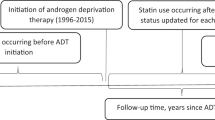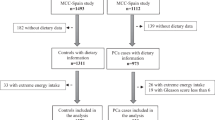Abstract
Background
Epidemiologic evidence for a serum cholesterol-prostate cancer link is mixed. Prostate-specific antigen (PSA) is positively correlated with cholesterol, potentially increasing PSA-driven biopsy recommendations in men with high cholesterol, though biopsy compliance may be lower in men with comorbid conditions. These potential biases may affect PSA-driven biopsy rates and subsequent prostate cancer detection in men with high serum cholesterol. Our objective was to test the association between serum cholesterol and prostate cancer risk in men receiving PSA independent, study-mandated prostate biopsies.
Methods
We conducted a post hoc analysis of data from 4974 non-statin users in REDUCE, a randomized trial in men with elevated PSA and a negative baseline biopsy. Men underwent 2- and 4-year trial-mandated prostate biopsies. Associations between baseline serum levels of total cholesterol, low-density lipoprotein (LDL), high-density lipoprotein (HDL) and prostate cancer risk, overall and by Gleason grade (<7 vs. ≥7), were examined using multivariable logistic regression.
Results
High total serum cholesterol was associated with an increased risk of high-grade prostate cancer diagnosis (OR per 10 mg/dL 1.05; 95% CI 1.00–1.09; p = 0.048), but cholesterol was unrelated to either overall or low-grade prostate cancer risk (p-values >0.185). There was no association between serum LDL and overall, low- or high-grade prostate cancer risk (p-values >0.137). In contrast, elevated serum HDL was associated with increased risk of both overall (OR per 10 mg/dL 1.08; 95% CI 1.01–1.16; p = 0.033) and high-grade prostate cancer (OR per 10 mg/dL 1.14; 95% CI 1.01–1.28; p = 0.034).
Conclusions
In REDUCE, where all men received PSA independent, trial-mandated biopsies thus ensuring complete prostate cancer ascertainment, high total serum cholesterol and high HDL were associated with increased risk of high-grade prostate cancer, supporting a cholesterol-prostate cancer link.
This is a preview of subscription content, access via your institution
Access options
Subscribe to this journal
Receive 4 print issues and online access
$259.00 per year
only $64.75 per issue
Buy this article
- Purchase on Springer Link
- Instant access to full article PDF
Prices may be subject to local taxes which are calculated during checkout
Similar content being viewed by others
References
Calle EE, Kaaks R. Overweight, obesity and cancer: epidemiological evidence and proposed mechanisms. Nat Rev Cancer. 2004;4:579–91.
Allott EH, Masko EM, Freedland SJ. Obesity and prostate cancer: weighing the evidence. Eur Urol. 2013;63:800–9.
Ishikawa-Takata K, Ohta T, Moritaki K, Gotou T, Inoue S. Obesity, weight change and risks for hypertension, diabetes and hypercholesterolemia in Japanese men. Eur J Clin Nutr. 2002;56:601–7.
Pelton K, Freeman MR, Solomon KR. Cholesterol and prostate cancer. Curr Opin Pharmacol. 2012;12:751–9.
Zhuang L, Kim J, Adam RM, Solomon KR, Freeman MR. Cholesterol targeting alters lipid raft composition and cell survival in prostate cancer cells and xenografts. J Clin Invest. 2005;115: 959–68.
Llaverias G, Danilo C, Wang Y, Witkiewicz AK, Daumer K, Lisanti MP, et al. A Western-type diet accelerates tumor progression in an autochthonous mouse model of prostate cancer. Am J Pathol. 2010;177:3180–91.
Solomon KR, Pelton K, Boucher K, Joo J, Tully C, Zurakowski D, et al. Ezetimibe is an inhibitor of tumor angiogenesis. Am J Pathol. 2009;174:1017–26.
Mondul AM, Weinstein SJ, Virtamo J, Albanes D. Serum total and HDL cholesterol and risk of prostate cancer. Cancer Causes Control. 2011;22:1545–52.
Platz EA, Till C, Goodman PJ, Parnes HL, Figg WD, Albanes D, et al. Men with low serum cholesterol have a lower risk of high-grade prostate cancer in the placebo arm of the prostate cancer prevention trial. Cancer Epidemiol Biomark Prev. 2009;18:2807–13.
Heir T, Falk RS, Robsahm TE, Sandvik L, Erikssen J, Tretli S. Cholesterol and prostate cancer risk: a long-term prospective cohort study. BMC Cancer. 2016;16:643.
YuPeng L, YuXue Z, PengFei L, Cheng C, YaShuang Z, DaPeng L, et al. Cholesterol Levels in Blood and the Risk of Prostate Cancer: A Meta-analysis of 14 Prospective Studies. Cancer Epidemiol, Biomark Prev. 2015;24:1086–93.
Zapata D, Howard LE, Allott EH, Hamilton RJ, Goldberg K, Freedland SJ. Is PSA related to serum cholesterol and does the relationship differ between black and white men? Prostate. 2015;75:1877–85.
Hamilton RJ, Goldberg KC, Platz EA, Freedland SJ. The influence of statin medications on prostate-specific antigen levels. J Natl Cancer Inst. 2008;100:1511–8.
Fischer S, Sun S, Howard LE, Moreira DM, Castro-Santamaria R, Andriole GL, et al. Baseline subject characteristics predictive of compliance with study-mandated prostate biopsy in men at risk of prostate cancer: results from REDUCE. Prostate Cancer Prostatic Dis. 2016;19:202–8.
Tangen CM, Goodman PJ, Till C, Schenk JM, Lucia MS, Thompson IM Jr.. Biases in recommendations for and acceptance of prostate biopsy significantly affect assessment of prostate cancer risk factors: results from two large randomized clinical trials. J Clin Oncol. 2016;34:4338–44.
Andriole G, Bostwick D, Brawley O, Gomella L, Marberger M, Tindall D, et al. Chemoprevention of prostate cancer in men at high risk: rationale and design of the reduction by dutasteride of prostate cancer events (REDUCE) trial. J Urol. 2004;172:1314–7. (4 Pt 1)
Freedland SJ, Hamilton RJ, Gerber L, Banez LL, Moreira DM, Andriole GL, et al. Statin use and risk of prostate cancer and high-grade prostate cancer: results from the REDUCE study. Prostate Cancer Prostatic Dis. 2013;16:254–9.
National Cholesterol Education Program Expert Panel on Detection E, Treatment of High Blood Cholesterol in A. Third report of the National Cholesterol Education Program (NCEP) expert panel on detection, evaluation, and treatment of high blood cholesterol in adults (adult treatment panel III) final report. Circulation. 2002;106:3143–421.
de Bono JS, Logothetis CJ, Molina A, Fizazi K, North S, Chu L, et al. Abiraterone and increased survival in metastatic prostate cancer. N Engl J Med. 2011;364:1995–2005.
Mostaghel EA, Solomon KR, Pelton K, Freeman MR, Montgomery RB. Impact of circulating cholesterol levels on growth and intratumoral androgen concentration of prostate tumors. PloS ONE. 2012;7:e30062.
Farwell WR, D’Avolio LW, Scranton RE, Lawler EV, Gaziano JM. Statins and prostate cancer diagnosis and grade in a veterans population. J Natl Cancer Inst. 2011;103:885–92.
Van Hemelrijck M, Walldius G, Jungner I, Hammar N, Garmo H, Binda E, et al. Low levels of apolipoprotein A-I and HDL are associated with risk of prostate cancer in the Swedish AMORIS study. Cancer Causes Control. 2011;22:1011–9.
Toth PP. High-density lipoprotein as a therapeutic target: clinical evidence and treatment strategies. Am J Cardiol. 2005;96:50K–58K. Discussion 34K–35K.
Voight BF, Peloso GM, Orho-Melander M, Frikke-Schmidt R, Barbalic M, Jensen MK, et al. Plasma HDL cholesterol and risk of myocardial infarction: a mendelian randomisation study. Lancet. 2012;380:572–80.
Keene D, Price C, Shun-Shin MJ, Francis DP. Effect on cardiovascular risk of high density lipoprotein targeted drug treatments niacin, fibrates, and CETP inhibitors: meta-analysis of randomised controlled trials including 117,411 patients. BMJ. 2014;349:g4379.
Tan P, Wei S, Tang Z, Gao L, Zhang C, Nie P, et al. LDL-lowering therapy and the risk of prostate cancer: a meta-analysis of 6 randomized controlled trials and 36 observational studies. Sci Rep. 2016;6:24521.
Acknowledgements
Funding: This study was supported by NIH 1K24CA160653 (S.J.F.), and by the American Institute for Cancer Research (E.H.A), and Irish Cancer Society John Fitzpatrick Fellowship (E.H.A).
Author information
Authors and Affiliations
Corresponding author
Ethics declarations
Conflict of interest
The REDUCE study was funded by GlaxoSmithKline. Dr Castro-Santamaria is an employee of GlaxoSmithKline. Dr Andriole is a consultant for GlaxoSmithKline. The authors declare that they have no conflict of interest.
Electronic supplementary material
Rights and permissions
About this article
Cite this article
Jamnagerwalla, J., Howard, L.E., Allott, E.H. et al. Serum cholesterol and risk of high-grade prostate cancer: results from the REDUCE study. Prostate Cancer Prostatic Dis 21, 252–259 (2018). https://doi.org/10.1038/s41391-017-0030-9
Received:
Accepted:
Published:
Issue Date:
DOI: https://doi.org/10.1038/s41391-017-0030-9
This article is cited by
-
Association of TyG index with prostate-specific antigen (PSA) in American men: results from NHANES, 2003–2010
Irish Journal of Medical Science (1971 -) (2024)
-
Establishment and validation of serum lipid-based nomogram for predicting the risk of prostate cancer
BMC Urology (2023)
-
A high high-density lipoprotein level is associated with Gleason score upgrade in Chinese patients diagnosed with high-grade prostate carcinoma
BMC Urology (2023)
-
Metabolic syndrome is associated with aggressive prostate cancer regardless of race
Cancer Causes & Control (2023)
-
The associations between serum high-density lipoprotein cholesterol levels and malignant behavior in pancreatic neuroendocrine neoplasms
Lipids in Health and Disease (2022)



